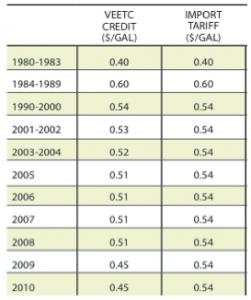A familiar face in the ethanol industry, and a familiar name here on Domestic Fuel, is now working for Florida-based Protec Fuel.
 Michelle Kautz has been hired as the company’s Public Relations/Development Director to manage Protec’s marketing and public relations programs along with coordinating sales efforts targeted at fuel distributors and retailers.
Michelle Kautz has been hired as the company’s Public Relations/Development Director to manage Protec’s marketing and public relations programs along with coordinating sales efforts targeted at fuel distributors and retailers.
Kautz has been working in the ethanol industry for nearly 10 years. She formerly was the Market Development Director at Growth Energy where she was responsible for assisting in the installation of E85 and ethanol blender pumps. Prior, she held the position as the Deputy Director of the National Ethanol Vehicle Coalition (NEVC). She also is a freelance writer for ZimmComm New Media where her blogs can be read right here on Domestic Fuel.
 “We are excited to Have Michelle on our team. She will have an immediate positive impact due to her extensive experience in working on E85 programs with distributors and retailers,” noted Todd Garner, CEO for Protec Fuels. “With Michelle at Protec, we can now better serve our existing customers to help them grow their ethanol volumes and also expand our business more quickly through new retailers.”
“We are excited to Have Michelle on our team. She will have an immediate positive impact due to her extensive experience in working on E85 programs with distributors and retailers,” noted Todd Garner, CEO for Protec Fuels. “With Michelle at Protec, we can now better serve our existing customers to help them grow their ethanol volumes and also expand our business more quickly through new retailers.”
As a footnote, Growth Energy closed its Jefferson City, Missouri office – which was formally NEVC – as of December 1. NEVC merged with Growth Energy back in June 2009 to form the Market Development arm of the ethanol organization. Phil Lampert, who was also part of the Growth Energy Missouri office and a long-time ethanol industry promoter, says he is “still working on E85 infrastructure as a consultant to several key ethanol marketers and producers.”






 During his Tuesday morning press call with agriculture reporters, Sen. Chuck Grassley (R-IA) once again defended the tax credit for ethanol being extended in the tax bill poised to be passed by the Senate.
During his Tuesday morning press call with agriculture reporters, Sen. Chuck Grassley (R-IA) once again defended the tax credit for ethanol being extended in the tax bill poised to be passed by the Senate. 

 Extending the Volumetric Ethanol Excise Tax Credit (VEETC) is estimated to cost about $6 billion dollars in 2011 at the current rate in the Senate bill of 45 cents per gallon. The United States spends about $750 million per day on imported oil, or $5.25 billion per week. Which means, extending the VEETC through 2011 would be the equivalent to about one week’s worth of oil imports – eight days, to be precise.
Extending the Volumetric Ethanol Excise Tax Credit (VEETC) is estimated to cost about $6 billion dollars in 2011 at the current rate in the Senate bill of 45 cents per gallon. The United States spends about $750 million per day on imported oil, or $5.25 billion per week. Which means, extending the VEETC through 2011 would be the equivalent to about one week’s worth of oil imports – eight days, to be precise.